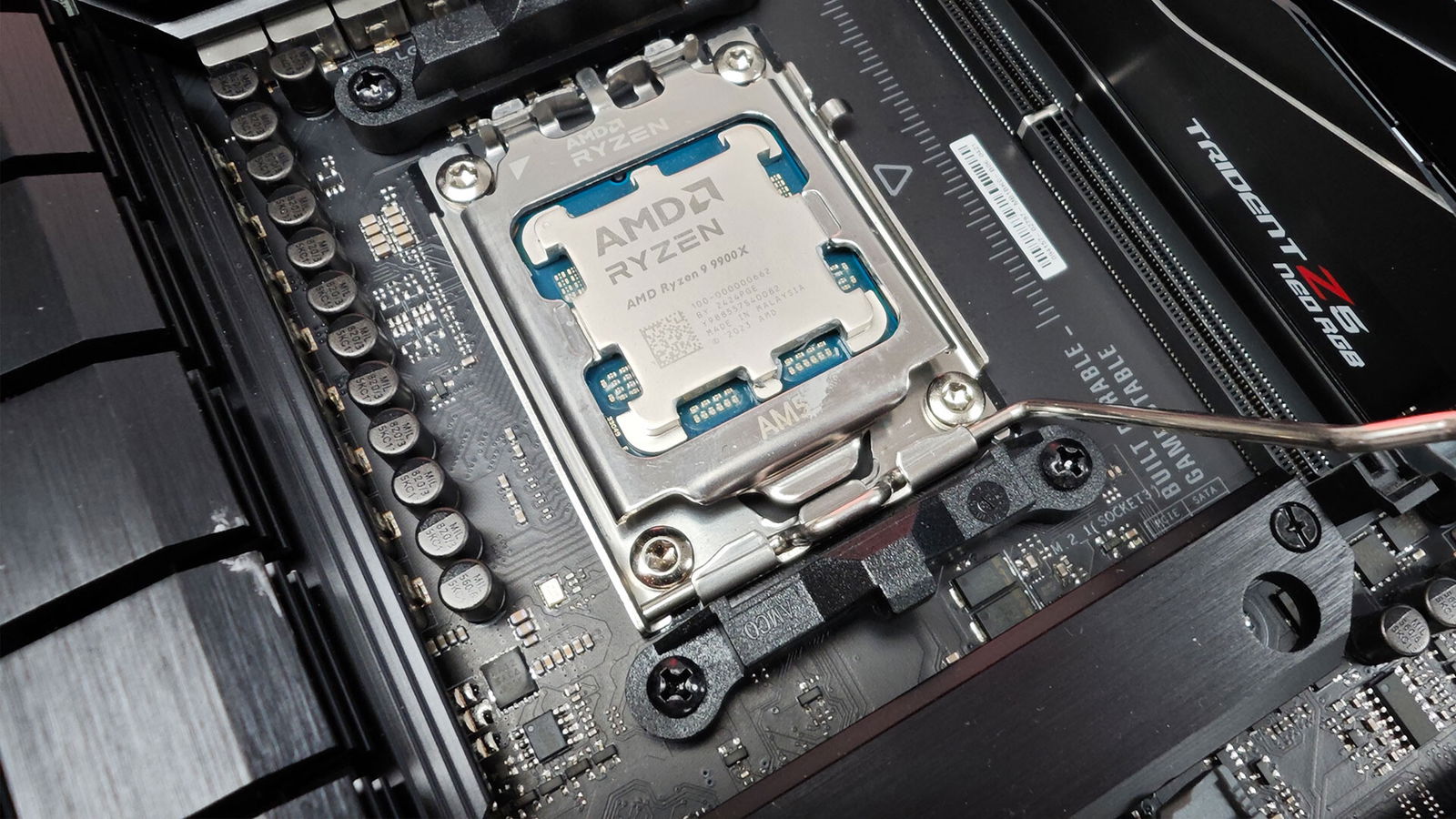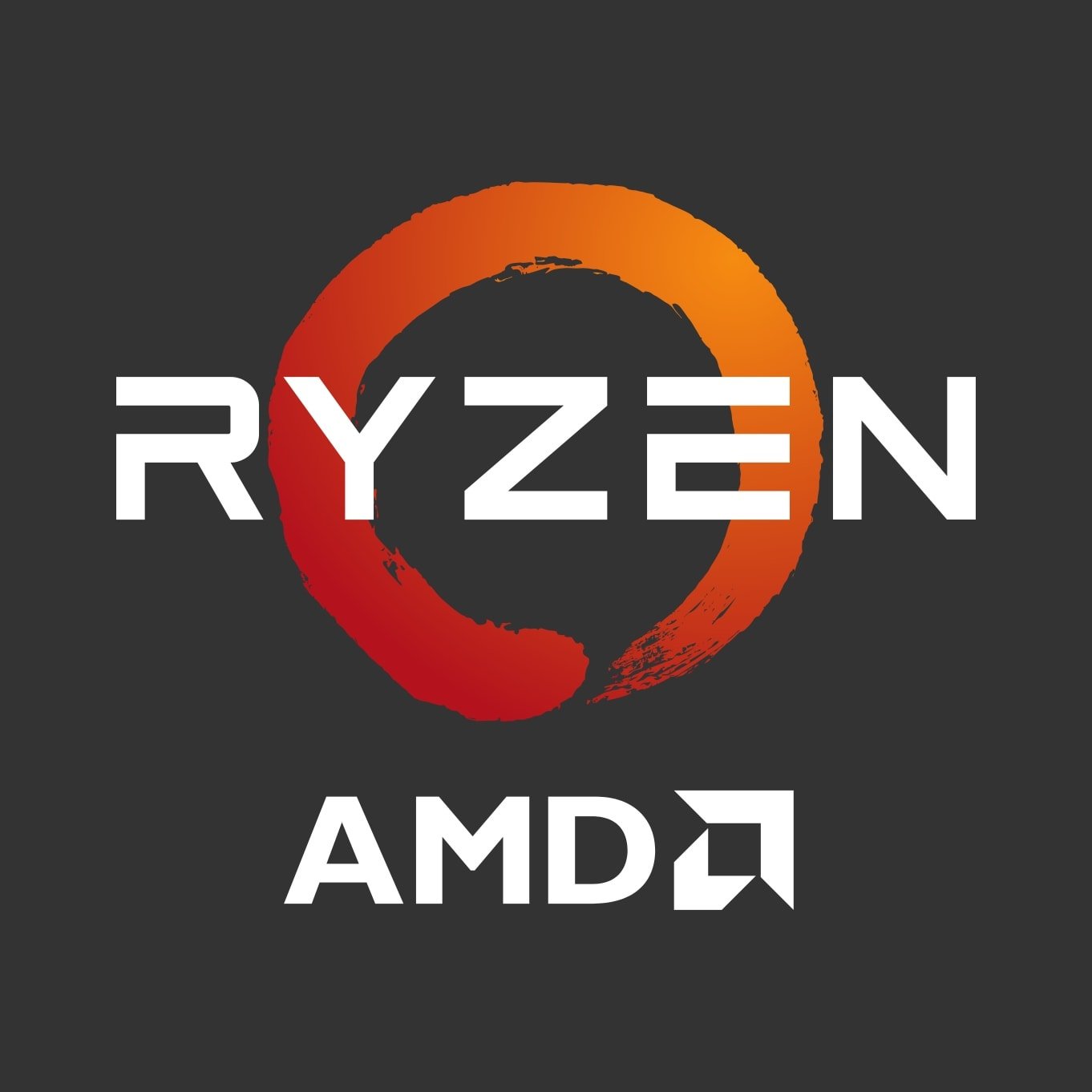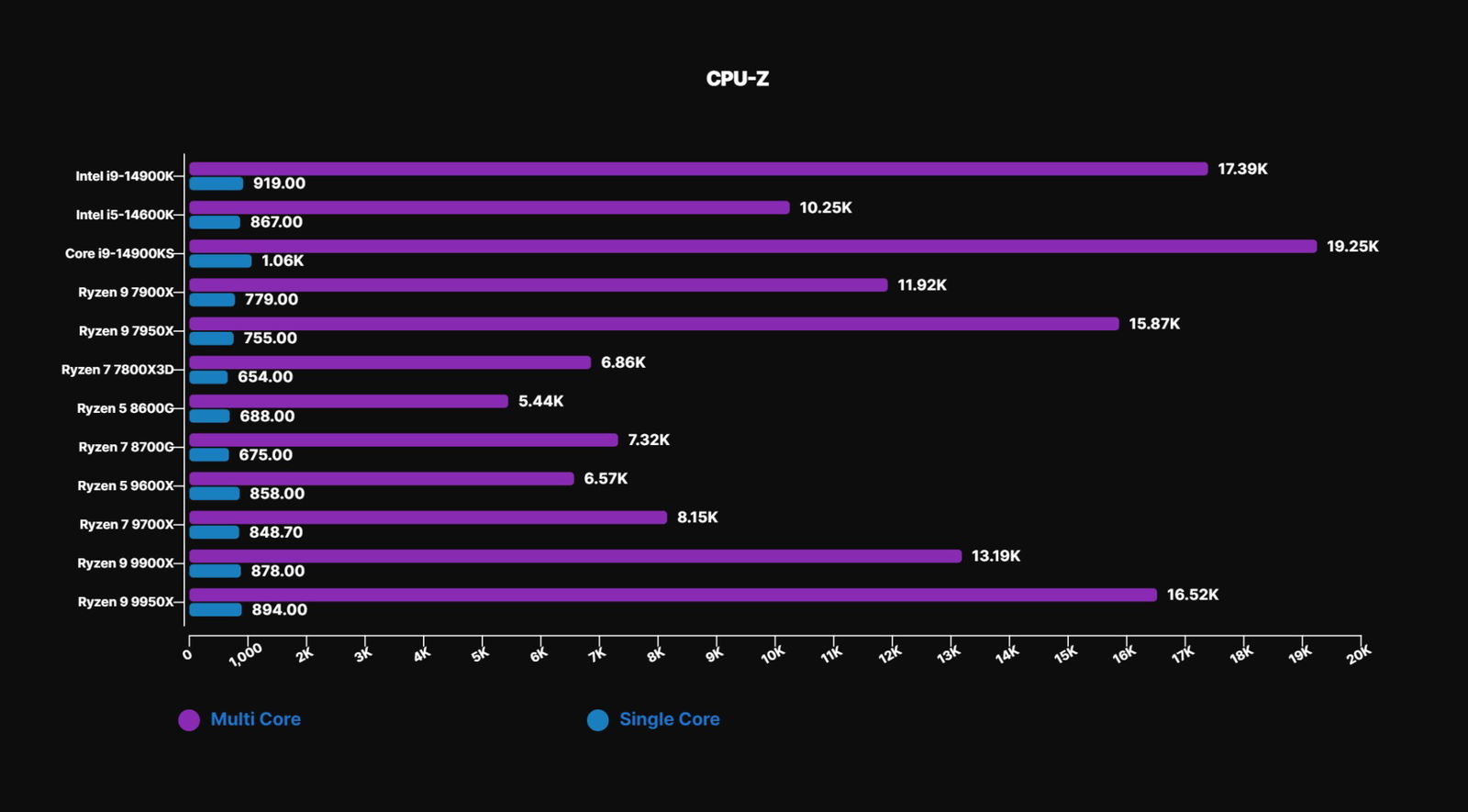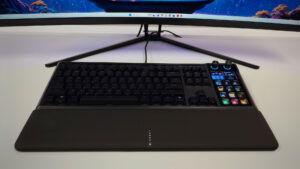On the heels of the Ryzen 5 9600x and Ryzen 7 9700x CPU launch, AMD is ready to release the new and improved Ryzen 9 9900x and 9950x CPUs to the masses. This latest iteration of the Ryzen 9 is focused on leveraging every ounce of processing power out of the 9900x and 9950x while simultaneously creating arguably their most efficient Ryzen 9s to date. All while striving to keep things in step with the competition.
Built on the new Zen 5 Architecture, the 9900x is built from the ground up for efficiency. Boasting some impressive efficiency boosts over the Zen 4 architecture, the new Zen 5 represents a fairly large leap forward for AMD. The ability to handle true 512-bit data-pathing to produce doubled AVX-512 throughput in the Zen 5 architecture is a step up from that of the previous generation. This becomes more impressive when also factoring in that this is accomplished while maintaining its full frequency processing capabilities. With all this in mind, it’s easy to say that the Zen 5 architecture promises a bright future for AMD’s Ryzen CPUs.

Another impressive aspect of this new architecture is its improved IPC (instruction per cycle) numbers. IPC is, in essence, how well the CPU can handle multiple pipeline instructions simultaneously while also looking ahead to create efficiency on upcoming inputs. The Zen 5 architecture has seen an impressive boost in performance over previous generations.
Finally, another improvement with this latest architectural design is increased power efficiency while maintaining high processing speeds. The Zen 5 CCDs (Core Chip Dies) leverage the TSMC 4nm process, which means there is less power draw per process. In layman’s terms, it means more processing speed with less power requirements. According to AMD’s internal testing, this translates to an average of +22% gains in performance-per-watt.
This is the context for the new Ryzen 9 9900x, a CPU built to ride the line between speed and efficiency. In fact, in AMD’s own marketing, the 9900x is presented as the model of efficiency, using less to create more. This becomes evident simply from looking at the spec sheet. With 12 cores and 24 threads, the 9900x has fewer cores than the i9 14900 (the closest Intel comparable), with 24 cores and 32 threads. More interesting still is that from a numbers perspective, the 9900x has the same core/thread count as the last generation Ryzen 9 7900x.

However, it’s how AMD has leveraged every ounce of processing power out of the 9900x that makes it an impressive feat. When put on the bench, the 9900x tells an interesting story that reinforces AMD’s objective of doing more with less. For our testing, the 9900x was put on our bench, which features an ASUS X670 Master motherboard and 32 GB DDR5-6400 EXPO memory supplied by AMD, a Lexar PCI-E Gen4 2TB m.2 SSD, with a 1000Watt Gigabyte PSU, in a be Quiet! Dark Base Pro 901 PC Case, paired with an AMD Radeon RX 7900 XTX.
“Content creation, such as video and audio editing, are no match for the processing power of the 9900x, which easily handles both with ease.”
To ensure optimal performance, the test system runs the latest Windows 11 update with up-to-date drivers and software from AMD. This configuration allowed us to thoroughly evaluate the Ryzen 9 9900x. An updated Chip Driver set from AMD was also provided for these tests and is designed to optimize gaming results by leveraging the Windows process priority assignment suite.
A quick note on this chip driver: to get the best results, we recommend fully removing your current chip driver, restarting, and then running this latest chip driver install. Not doing this can result in the chip driver not installing properly and thus reducing the CPU’s overall performance. Another quick note is that while a series of synthetic benchmarks are performed to generate some of our data, it’s the real-world tests that help give a complete story of where the CPU fits in our current tech climate and as such, much of the focus will lean toward the latter tests.
CPU-Z Benchmarks Chart
As mentioned, the Ryzen 9 9900x is most comparable to the i9 14900k. In single-core testing, the 9900x comes in slightly slower than the 14900k with a difference of 185 points. In multi-core testing, however, the i9 is the clear leader, clocking in at 6,063 points ahead of the 9900x.
Interestingly, when compared to the previous generation Ryzen 9 7900x, the 9900x pulls ahead by roughly 100 points in single-core tests and an impressive 1,264 points in multi-core testing (*7900x performance tests taken from the official CPU-Z website). This helps give some context to the efficiency boosts between the two generations. While having the same core/thread count, the improved Zen 5 architecture helps push the 9900x performance up an impressive amount. It does make one wonder how the 9900x would compare if it had the same core/thread count as the i9 14900k.
Cinebench Benchmark Chart

As expected, Cinebench tells a story similar to that of CPU-Z. While the 9900x performed quite well in both single and multi-core tests, the i9 14900k, with double the cores and an additional 12 threads, pulled ahead. What is interesting to note here, though, is that even with its increased core/thread count in single-core testing, the i9 only managed to come out a few points ahead. This would seem to indicate that even with a smaller thread count per core, the 9900x can perform quite well against the competition. It is also worth noting that the Ryzen 9 also requires slightly less power than the i9, making it a more efficient CPU.
“This generation of the Ryzen 9 represents possibly the first of many new refinements to the efficiency we will see from the Ryzen 9 lineup.”
Once again, when comparing it to the 7900x, the 9900x sees an impressive performance boost in both single-core scores (7900x – 2,034) and multi-core scores (7900x – 29,306), again highlighting the efficiency boosts present in this latest generation of the Ryzen 9 CPU (note that scores for the 7900x were taking from CPU-Monkey Cinebench scores).
What the synthetic benchmarks tell us is that while the i9 14900k is technically faster, the Ryzen 9 9900x manages to produce competitive processing speeds much more efficiently on a per-core basis. This is what makes the Ryzen 9 9900x and its Zen 5 architecture stand out; while it might not be able to beat Intel in the synthetic testing, this new architecture opens up a whole new world of possibility for what can be achieved in CPU development.
Game Benchmark Chart

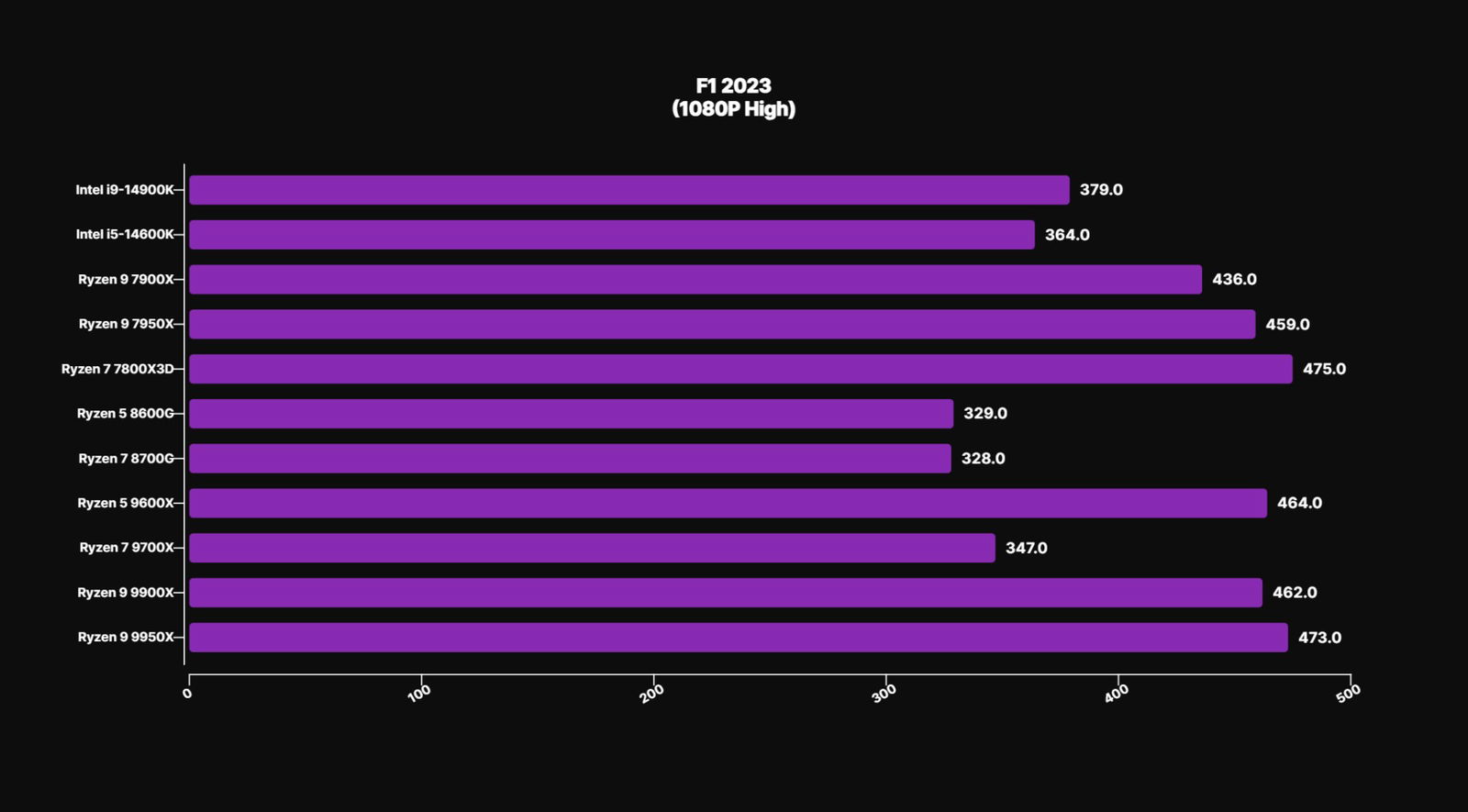
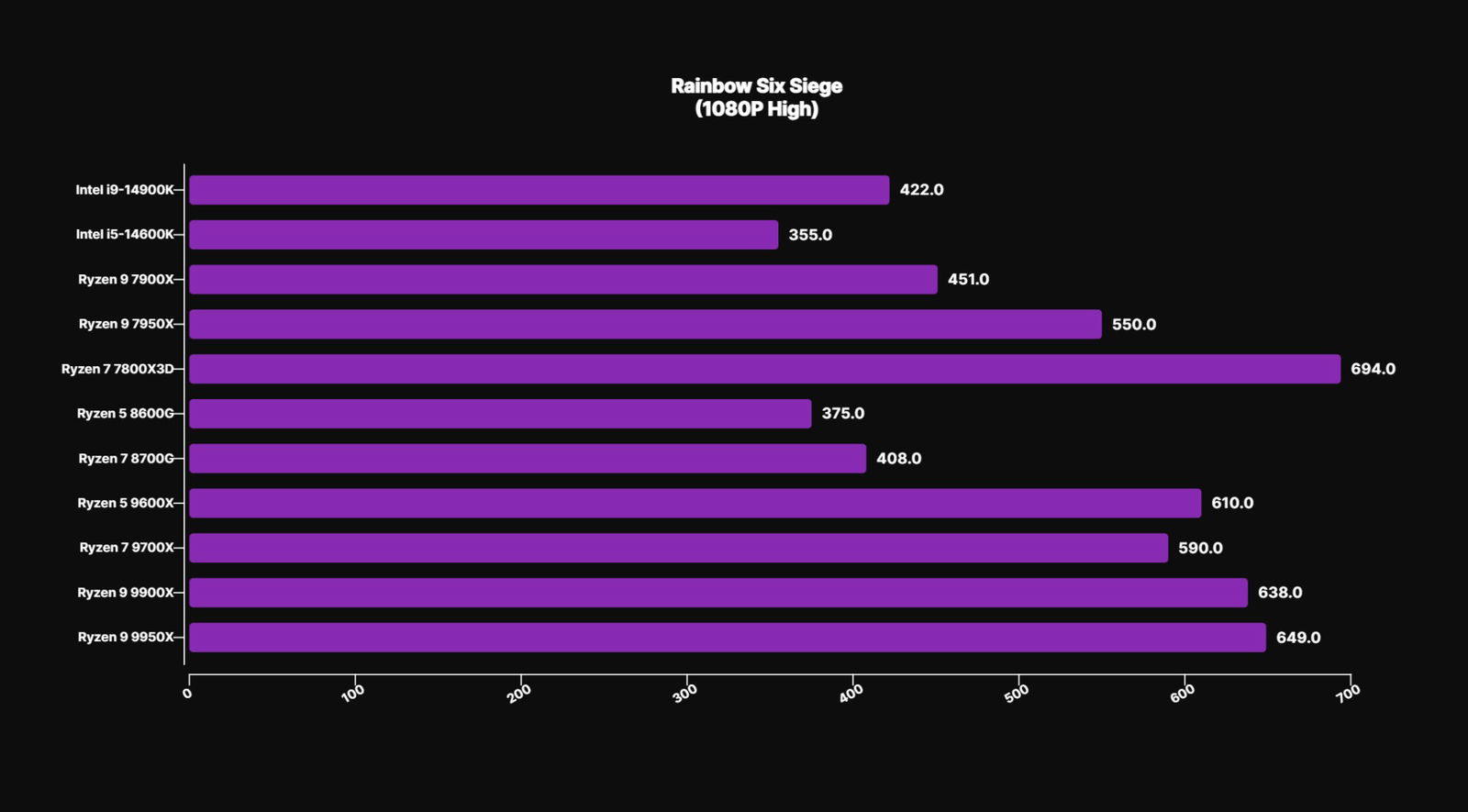
Shifting to some real-world testing, The Ryzen 9 9900x performed quite well, though some of the results were a bit different than expected. For instance, the i9 leaped ahead with Hitman 3 with an additional 24fps over the 9900x but came in with fewer fps than the 9900x by 28fps. Ashes of The Singularity: Escalation, however, was nearly identical on both systems, while Civ VI saw the i9 come in significantly faster than the 9900x. When the 7900x is thrown into the mix, things get even more interesting, with the 7900x outperforming the 9900x in Hitman and Civ but falling behind in Cyberpunk 2077 and Ashes of the Singularity.
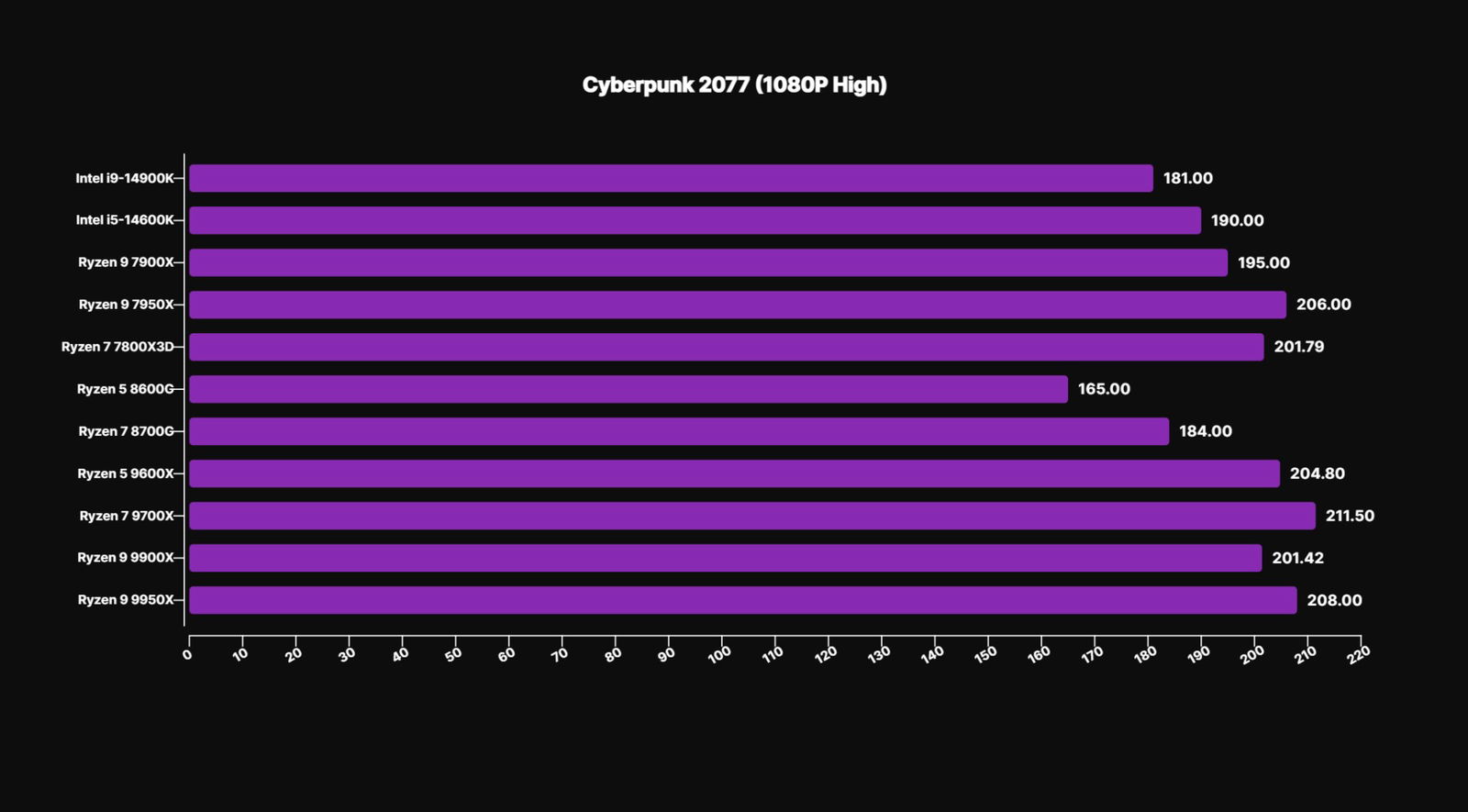
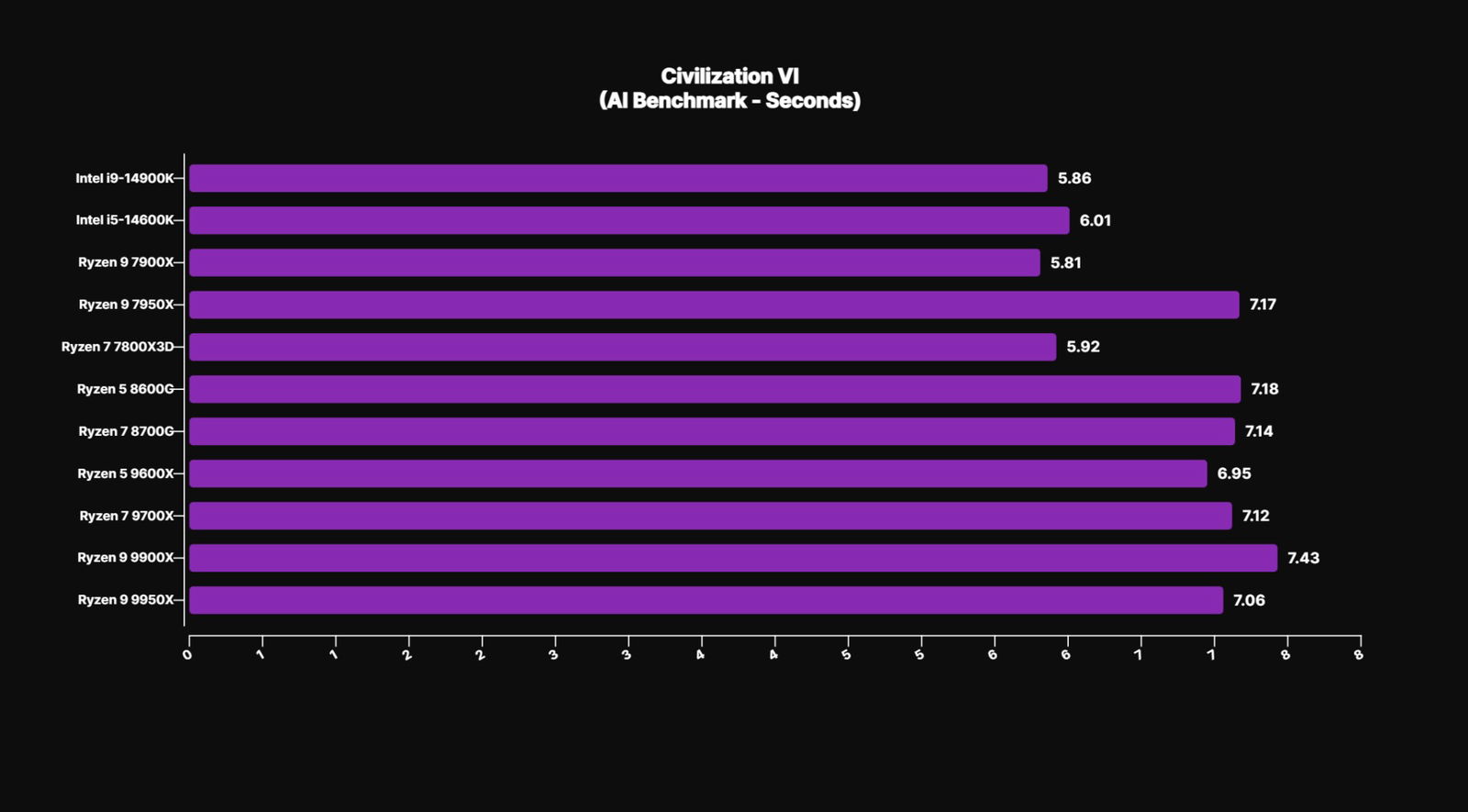
To some degree, this comes down to the life cycle of each of the CPUs represented here. As efficient as the 9900x is, not all games have been optimized for this new Zen 5 architecture, and such don’t leverage all of its capabilities. Additionally, many titles lean more heavily on GPU than CPU, making this new architecture less impactful on overall performance during testing.



On the note of the life cycle for each CPU, I would be curious to run these tests again under the same conditions in 6 months to see if driver updates impact the final results. The 9900x is releasing today, while the i9 14,900k and the 7900x have been out for quite some time. There is plenty of time to refine and optimize.
Shifting to productivity, like our Ryzen 5 9600x review, I ran the 9900x through a series of real-world productivity tests to see how it faired. Content creation, such as video and audio editing, are no match for the processing power of the 9900x, which easily handles both with ease. Likewise, photo editing and daily productivity work run silky smooth. For science, I once again set up multiple 4k video edit renders in Davinici and then proceeded to play DOOM Eternal at Ultra settings to see how the Ryzen 9 faired. There were absolutely no issues with performance during the test, and the Ryzen 9 easily handled both tasks.

The Ryzen 9 9900x is an interesting CPU, mainly because, unlike earlier generations that focused on simply pushing out more power, AMD intentionally shifted their focus slightly. While performance is still clearly a driving consideration, there is also an intentional focus on efficiency. This generation of the Ryzen 9 represents possibly the first of many new refinements to the efficiency we will see from the Ryzen 9 lineup.
“The Ryzen 9 9900x is an impressive update, boasting some impressive process efficiency while reducing overall power requirements, making it a promising contender at its price point.”
One of the questions that comes up when benchmarking a CPU is whether it’s worth upgrading from your current CPU. This becomes more challenging when comparing the 7900x to the 9900x. While there are some marked improvements in the synthetic benchmarks, gaming benchmarks tell a slightly different story. The 7900x is no slouch; it’s an excellent CPU. The 9900x will most likely pull ahead; however, in the future, driver updates will help continue to leverage what is capable of the new Zen 5 Architecture.
The Ryzen 9 9900x is an impressive update to the Ryzen 9 lineup. It boasts and delivers some impressive process efficiency while also reducing the overall power requirements. While it might not beat out the competition, its potential for future refinement and realization, as well as its price point of $499.99, makes it a promising contender for this tier of CPU.
